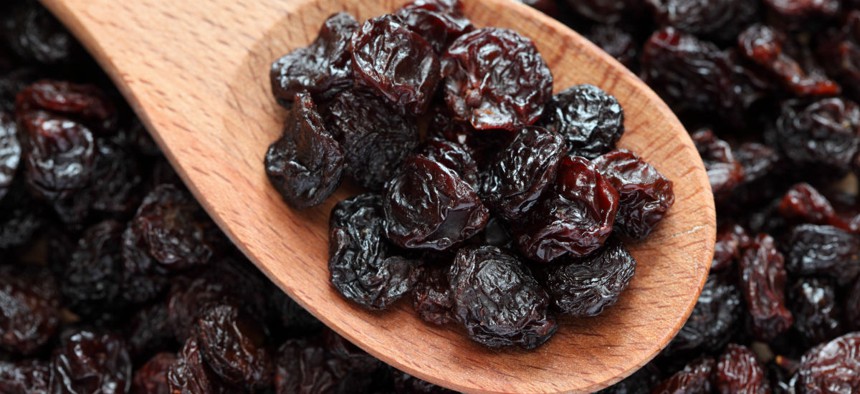
StepanPopov/Shutterstock.com
Supreme Court To USDA: Hands Off the Raisins
The court struck down a program that seized excess raisins in an effort to stabilize prices.
The Supreme Court said Monday that the government cannot demand a cut of farmers' raisins, striking down a scheme that the justices had compared to communism and described as "the world's most outdated law."
In an 8-1 decision that included an allusion to the French Revolution and an assurance that raisins "are a healthy snack," the court put to rest a years-long dispute over a New Deal-era law and the Raisin Administrative Committee it created.
The Agriculture Department frequently tells farmers that they can only plant a certain amount of a particular crop in a certain year, or buys up excess supply, to help stabilize prices. But thanks to a 1937 law, control of the raisin market works differently: Farmers have to hand over a certain percentage of their raisins to the federal government.
That's unconstitutional, the court said Monday.
The raisin law always faced long odds at the Supreme Court. During oral arguments in an earlier iteration of the case, Justice Elena Kagan suggested that it might be "the world's most outdated law." At the same session, Justice Antonin Scalia compared it to a high-stakes threat: "Part of that penalty was, you know, your raisins or your life," he said.
When the raisin regime came back before the high court this spring, Scalia compared it to communism. "Central planning was thought to work very well in 1937, and Russia tried it for a long time," he said. And Chief Justice John Roberts joked that "you come up with the truck and you get the shovels and you take their raisins, probably in the dark of night."
Technically, the legal question before the court was whether the raisin scheme constituted a "taking." The Fifth Amendment says the government cannot take "private property … for public use, without just compensation." And the court's decision was a literal one: Yes, when the government takes farmers' raisins, it's "taking" their raisins for Fifth Amendment purposes.
"The reserve requirement imposed by the Raisin Committee is a clear physical taking. Actual raisins are transferred from the growers to the Government. Title to the raisins passes to the Raisin Committee," Chief Justice John Roberts wrote for the court's majority.
Roberts went to great lengths, however, to limit the ruling to raisins, differentiating dried grapes from other products that the government might be able to take without violating the Constitution.
For example, "raisins are not like oysters," Roberts wrote. The Supreme Court previously upheld a law allowing the state to demand a certain share of farmers' oysters, saying they were not the farmers' property. But raisins, he said, "are private property—the fruit of the growers' labor."
Nor are raisins similar to toxic chemicals, or the trade secrets about how to make them.
The court has also upheld a law requiring pesticide manufacturers to turn over trade secrets about their products—which normally would be considered their property—in exchange for the right to sell them. The Justice Department cited that ruling in defending the raisin restrictions, arguing that raisin farmers simply had to turn over part of their yield—47 percent of it, in one year at issue in the case—in exchange for the right to sell the rest.
Roberts wasn't buying the analogy.
"Raisins are not dangerous pesticides; they are a healthy snack. A case about conditioning the sale of hazardous substances on disclosure of health, safety, and environmental information related to those hazards is hardly on point," he wrote.
The Justice Department also argued that raisin growers were free to plant other types of grapes if they didn't want to set any aside for the government. Again, Roberts was not swayed.
"Let them sell wine" is probably not much more comforting to the raisin growers than similar retorts have been to others throughout history," he said.
By focusing on the specifics of the raisin policy, Roberts sought to draw a distinction from other marketing orders that, for example, limit how much of a particular crop farmers can grow in a certain year. While those policies limit farmers' potential profit, Roberts wrote, they don't do so by taking control of products they've already produced.
"A physical taking of raisins and a regulatory limit on production may have the same economic impact on a grower. The Constitution, however, is concerned with means as well as ends," Roberts wrote.
Only Justice Sonia Sotomayor fully dissented from the court's ruling. "The Order may well be an outdated, and by some lights downright silly, regulation," she wrote, but it leaves farmers with at least some of their relevant property rights still intact, and therefore is not unconstitutional.
(Image via StepanPopov/Shutterstock.com)






